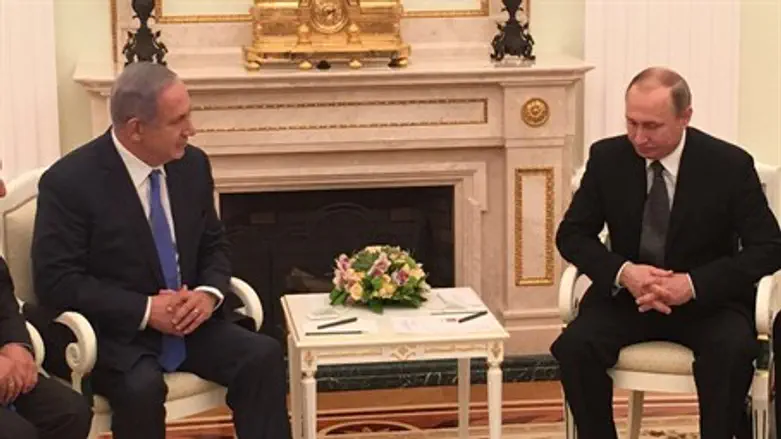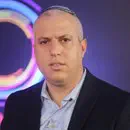
Prime Minister Binyamin Netanyahu held a press briefing in Moscow on Thursday shortly after his meeting with Russian President Vladimir Putin, in which he clarified that Israeli control of the Golan Heights is a "red line."
Netanyahu stated that in the meeting with Putin significant achievements were made for the security of Israel.
"I finished a very important meeting with President Putin - very important for the security of Israel," said Netanyahu in a briefing afterwards for political correspondents.
"Putin suggested that the (Israeli) Air Force commander and my military secretary meet with his defense minister, and they went out there and discussed constructive cooperation between our armies on several issues that were raised."
Netanyahu said that the cooperation "is essential because we have to preserve the freedom of activity of the IDF and the Air Force in places that are important to us - and I think this matter was achieved."
When asked if there were any significant problems in the coordination of the armies, he said, "problems were raised. From the very nature of things there is always friction, and if we don't deal with it, it is liable to develop into something a lot larger, and we've seen things like that in the past."
"Therefore I flew in September to Moscow when the Russian forces entered the territory," said Netanyahu, referencing how Russia began deploying troops in Syria to prop up the regime of Bashar al-Assad.
He noted that the military coordination achieved in the September meeting "demands strengthening now and then by the leaders, and that's what we did today. I think that the fact that I brought here the Air Force commander helped to make an amendment and coordination which is very important for the IDF."
"We need to be aware that there's a war on our borders. Civilians aren't always aware of that, but we are constantly discussing that. The conditions are changing and we need to make sure they don't turn against us. This trip helped in order for there to be more coordination."
Netanyahu said, "our freedom of operation is unharmed. But if you're in a situation of friction, time after time after another time, you can find yourself in a situation in which things happen that afterwards harm the freedom of operation. There is no problem now, but the friction demands coordination; I acted so that we can continue to act as we have acted."
The Prime Minister mentioned the Golan Heights, which has been in the news this week after on Sunday he held the first Cabinet meeting there since the region was liberated in the 1967 Six Day War. His meeting sparked an international backlash of condemnation, and in it he vowed that the Golan would always remain Israeli.
According to Netanyahu, Putin did not expressed any position regarding Israeli sovereignty on the Golan Heights.
"There is the official position of the Russian Foreign Minister, but in practice I don't think that anyone realistically expects that we will come down from the Golan Heights."
Netanyahu was asked about the early stages of Iran receiving the advanced S-300 anti-aircraft missile system from Russia, and said, "the topic of the different weapons systems came up, I think that it came up in a realistic and responsible manner. That also adds to our security."
